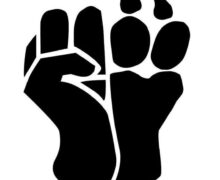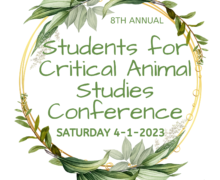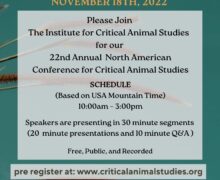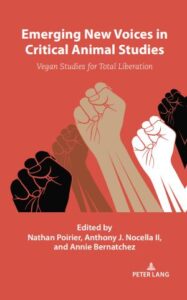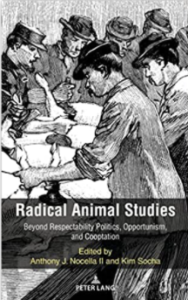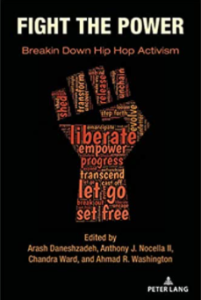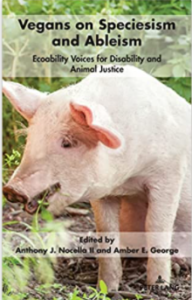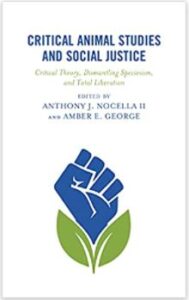2018 17th Annual North American Conference for Critical Animal Studies

2018 17th Annual North American Conference for Critical Animal Studies
October 6 to 7, 2018
University of Colorado, Boulder, Colorado, USA
Building: Engineering Center Classroom Wing
Rooms: Room 105
For map click here
(free and open to the public)
Facebook Event page: https://www.facebook.com/events/577603475906246/
__________________________________________________
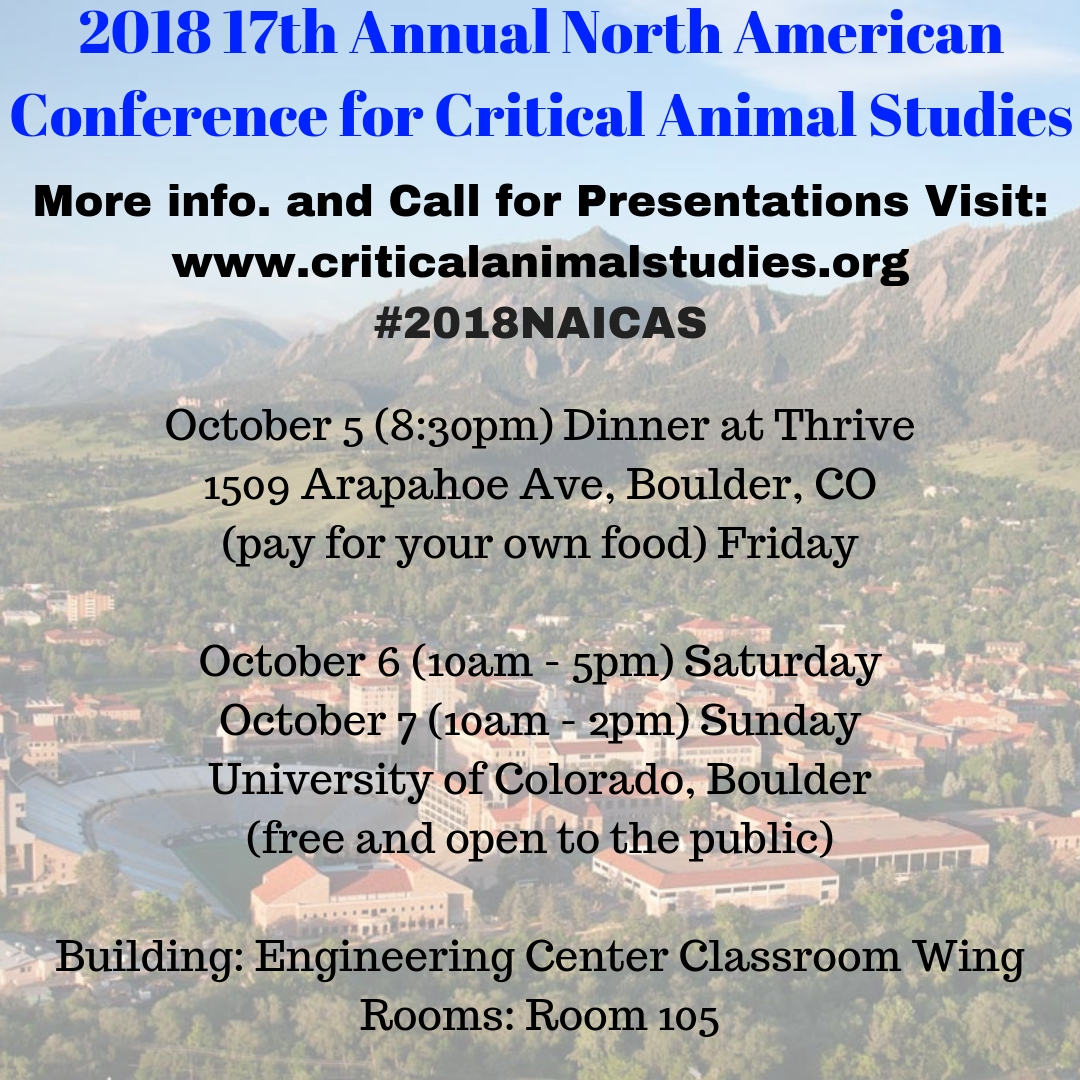
The Institute for Critical Animal Studies (ICAS), rooted in animal liberation and anarchism, is an intersectional transformative holistic theory-to-action activist led based organization to unapologetically examine, explain, be in solidarity with, and be part of radical and revolutionary actions, theories, groups and movements for total liberation and to dismantle all systems of domination and oppression, in hopes for a just, equitable, inclusive, and peaceful world.
_______________________________
Conference Committee:
- Max Knight – mk9391@gmail.com or 646-525-5015
- Anthony Nocella -nocellat@yahoo.com or 315-657-2911 cellphone
_______________________________
Transportation on Friday October 5 from Denver, Colorado Airport:
- 3pm pick-up by Max Knight contact him to reserve.
- 10pm pick-up by Max Knight contact him to reserve.
_______________________________________________________________________
SCHEDULE
_______________________________
Friday – October 5, 2018
- 8:30pm Dinner at Thrive (everyone pays for their own food)
_______________________________
Saturday – October 6, 2018
*Take care of your own breakfast, coffee, and juice.
_______________________________
10am to 11:30am – Session One
Community Building and the End of Capitalism
Chair:
1. Solidarity with Nonhuman Animals: Insights from Cultural Anthropology
Max Lieberman
- ABSTRACT: Academics are increasingly turning their attention to the possibility of humans developing solidarity with nonhuman forms of life. Environmental philosopher Timothy Morton’s book, Humankind: Solidarity with Non-Human People, is a recent work dealing with this subject that has received much attention. Drawing from cultural anthropology, I plan to not only answer the calls put forward by Morton and others, but also to expose those who are involved in animal and earth liberation struggles to forms of nonhuman solidarity they may have not come across before. My first example of human solidarity with nonhuman animals comes from research on the relationship between the inhabitants of Harar, Ethiopia and local wild hyenas. Hyenas are often feared, and even reviled, by humans. In Harar, however, hyenas have been encouraged to enter the city; hyenas are significant in the folklore of the Islamic community of Harar, are valued for their consumption of organic waste. Some people in Harar even hand-feed hyenas. Research on the hyenas of Harar contains embedded lessons concerning living with and creating community space for wild nonhumans. My second example will be drawn from my own fieldwork on wild bison in the Yellowstone ecosystem. A coalition of regional activists and indigenous communities has been working to expand the habitat of the Yellowstone bison herds for well over two decades. A nonprofit called Buffalo Field Campaign has operated a year-round effort to protect bison and secure greater habitat for them for much of this time. The activists associated with this campaign have given weeks, months, or years at a time to the Yellowstone bison; this is a case of solidarity with a single nonhuman species that is fruitful for many activists to examine. Both of these examples come from outside of the world of animal liberation/animal rights activism, but contain fruitful ideas for putting solidarity with nonhuman animals into practice. My presentation aims to benefit activist communities while also pushing academic discussion of nonhuman solidarity toward engaging with real-world examples, not just theory.
- BIOGRAPHY: Max Lieberman is a graduate student in cultural anthropology at the University of Iowa. He has long been involved in environmental struggles, beginning with the fight against fracking in his home state of Pennsylvania, and most recently opposing the Dakota Access Pipeline in Iowa. His path to adopting an animal liberation perspective began with an interest in wildlife, that grew into a fascination with all nonhuman animals. His graduate work focuses on efforts to conserve and restore wild bison, particularly the last wild herds that reside in the Yellowstone region.
2. Animal Genocides: Writing in the Name of the Iberian Rhinoceros
Aliya James Allen Weise
- ABSTRACT: Derrida asks if one can, “even in the name of fiction, think of a world without animals,” but also cautions that the “history we are attempting to interpret,” and the future which we are attempting to bring about, “can be called violence in the most morally neutral sense of the term and even includes the interventionist violence that is practiced […] in the service of or for the protection of the animal,” because it is in the final analysis “most often” in the service of “the human animal” (Derrida 2008). How then to write fiction on the ever-increasing number of “animal genocides” but to do so “in the name of the animal” (ibid)? This paper suggests that select fiction of the animal turn has attempted to accomplish just such a task, and in so doing reveals the necessity of an intersectional and trans-disciplinary approach that accounts for the entanglement of animal and human oppression. Relying on trans-disciplinary scholarship by David Herman, Sunaura Taylor, David A. Nibert, and Anthony J. Nocella I consider Butler’s Xenogenesis, Atwood’s MaddAddam, and Martel’s tripartite effort in Life of Pi, Beatrice and Virgil, and The High Mountains of Portugal to explore how literature offers essential opportunities—by destabilizing and disrupting genre, category, and epistemological norms—to offer a hospitable space for animals, in the name of animals. Rather than remaining entrenched in the what Carol L. Glasser and Arpan Roy characterize as “The Ivory Trap,” these works of fiction offer both areas of concern and opportunities for Literary and Critical Animal Studies, and thus contribute significantly to “new knowledge and theory with the aim of advancing liberation of nonhuman animals,” to “advance a praxis of emancipation in regard to nonhuman animals” (Nocella 2014).
- BIOGRAPHY: Aliya James Allen Weise is a Ph.D. Candidate at the George Washington University. His dissertation, Animal Genocides: Literature of the Animal Turn explores significant works of North American fiction that engage with and challenge the hegemonic human/animal binary, exposing the dyad as not only a site of intersectional oppression but as the prejudice which undergirds all others. In addition to his scholarly work in Critical and Literary Animal Studies, Aliya was an adjunct instructor at George Washington University’s Writing Program and now serves the diverse youth of San Diego High School in California teaching English-language literature and composition.
3. Conscious Eating & Hip-Hop: An Innovative Approach to Vegan Education and Awareness
Tony Quintanta
- ABSTRACT: Conscious Eating & Hip-Hop is an event series in Albuquerque, New Mexico, created by emcee/educator Tony Quintana (also known by his stage name I.Q. the Professor) and the Vegan Outreach Community Events Coordinator Victor Flores. The Conscious Eating and Hip-Hop events build on the notion that there is a natural intersection of hip-hop and veganism, and use free/family-friendly hip-hop shows as a platform to bring the community together, to introduce attendees to new vegan foods, and to share information about veganism. Past events have included discussion panels, Q&A sessions, brief presentations, and open mic sessions, in addition to live performances from local hip-hop artists. Since the series began in December 2017, three events have taken place, bringing more than 150 community members who have received information and education about veganism. This presentation gives more details about the event series including successes, challenges, and ideas for continuing to build this movement.
- BIOGRAPHY: Tony Quintana is an educator, emcee, and activist. He has worked in Health Promotion/Disease Prevention for over 8 years, and has conducted health education programs on a wide variety of topics including HIV, diabetes, fitness and nutrition. Tony earned his Master’s degree in Community Health Education and Bachelor’s degree in School Health Education from the University of New Mexico. He also holds several fitness certifications from the American Council on Exercise including Medical Exercise Specialist, Health Coach, and Group Fitness Instructor. As an emcee and show promoter, Tony (also known by his stage name I.Q. the Professor) has been very active in the local hip-hop scene in Albuquerque, NM where he co-founded the Conscious Eating and Hip-Hop event series, and is a co-founder of the Dezert Banditz hip-hop crew.
_______________________________
11:30am to 1:00pm – Session Two
Economics and the End of Capitalism
Chair:
1. Revisiting Assumptions of Past and Present Economic Systems, and Management Systems to Achieve a More Sustainable Future
Max Knight
- ABSTRACT: If for a moment we think of human history up until now in the context of the age of the universe or even just earth we will be humbled to know that we have existed as we know it for less than the blink of an eye. For better or worse humanity has expanded from simpler ways of organizing ourselves such as hunter gatherer societies towards the more complex society we currently live in. While an argument about whether complexity is a good thing or not could be fascinating I will simply observe that over long periods of time we tend towards organizing ourselves in consistently more and more complex ways. Generally speaking, many of these shifts in consciousness happen very quickly (often within a human generation) and are a huge leap in consciousness that allows and demands more complexity in our social structures. Within our lifetimes we can think of the way the internet and cell phones have radically transformed society or much longer ago the advent of agriculture would have allowed for larger groups to survive. If we take this broad view we can look at the moment in time in which we currently exist. While there are many very convincing arguments for doom and gloom, there is also many reasons for genuine hope. Through exploring existing organizations that are shifting the way hierarchies operate, we will learn about skills to actively create a new system (including economic system) that will better serve the needs of humanity. These systems that center the honoring of our human experience employ: nonviolent communication, love based community organizing, the advice process, gift economics and more. This talk comes from a place of love but also frustration. In the academic spaces I was privileged to share space and in which we learned of issues of race, class, gender, sexuality, ability etc. we learned invaluable perspectives on the multitudes of ways that the systems in play in society lead humans to treat each other and nonhumans horribly. As a problem solver and activist I find myself constantly approaching these challenges to be solved. The ideas offered in this talk are by no means solutions to all problems that humanity faces but are some which give me hope and help me look forward to the future. This talk is deeply rooted hope for building systems that make capitalism and oppression obsolete.
- BIOGRAPHY: Max Knight has been involved in animal liberation movements for 4 years. He grew up in Brooklyn, New York, lived briefly in Germany and has lived in Boulder for the last 5+ years. Since graduating from CU as an Environmental Engineer with a Minor in Ethnic Studies Max has started an urban farming startup, teaches yoga and continues to work on community building with the local animal liberation groups.
2. Animals, Disability and the End of Capitalism
John Lupinacci
- ABSTRACT: Animals, Disability, and the End of Capitalism: Voices from the Eco-ability Movement is an edited collection of essays from the leaders in the field of eco-ability. Animals, Disability, and the End of Capitalism is rooted in critical pedagogy, inclusive education, and environmental education, and the efforts of diverse disability activists working to weave together the complex diversity and vastly overlooked interconnections among nature, ability, and animals. Eco-ability challenges social constructions, binaries, domination, and normalcy. Animals, Disability, and the End of Capitalism challenges the concept of disability, animal, and nature in relation to human and man. Eco-ability stresses the interdependent relationship among everything and how the effect of one action such as the extinction of a species in Africa can affect the ecosystem in Northern California. Animals, Disability, and the End of Capitalism is timely and offers important critical insight from within the growing movement and the current academic climate for such scholarship. Animals, Disability, and the End of Capitalism shares insights and examples of radical experiences, pedagogical projects, and perspectives shaped by Critical Animal Studies, Critical Environmental Studies, and Critical Disability Studies. Contributing authors include Sarah R. Adams, Marissa Anderson, Judy K.C. Bentley, Mary Fantaske, Ava HaberkornHalm, Hannah Monroe, Nicole Pallotta, Daniel Salomon, and Meneka Thirukkumaran.
- BIOGRAPHY: John Lupinacci, Ph.D., is an Assistant Professor at Washington State University. He teaches pre-service teachers and graduate students in the Cultural Studies and Social Thought in Education (CSSTE) program using an approach that advocates for the development of scholar-activist educators aligned with principles of Critical Animal Studies. His experiences as a high school math and science teacher, an outdoor environmental educator, and a community activist all contribute to examining the relationships between schools and the reproduction of the cultural roots of social suffering and environmental degradation.
3. Liberate Your Language
Amanda Houdeschell
- ABSTRACT: “Language is a powerful tool. The words we choose do more than name or describe things; they assign status and value. Be careful, then, how you choose words that refer to non-human animals, for you may be using expressions that maintain prejudices against them.” – Noreen Mola and The Blacker Family. Challenging oppressive language has been an important tool in every major social justice movement. From discarding the universal usage of “man” and “mankind,” to banning ableist slurs, our vernacular has become more inclusive over time as a result of activists’ work. Thus, so too has our thinking moved in a progressive direction. Language shapes the world we live in, and so it is our responsibility as animal rights activists to develop an anti-speciesist framework for our language. In this presentation, we will take a look at seven key ways we can address human supremacy through the words we use: avoiding objectification, emphasizing individuality, boycotting industry terms, dismantling the us/them binary, refusing pejorative figures of speech, sentience as the basis for rights, and remembering ourselves as allies. This is not about being politically correct or choosing the “right” words; rather, it is about creating a world that respects nonhuman animals as the persons they are. This change can start with us–in our lifestyle choices, our activism, and our language.
- BIOGRAPHY: Amanda Houdeschell is 20 years old and studies nonprofit administration and philosophy at Cleveland State University, where she also works as a campus rep for peta2. Amanda is the co-founder of Species Revolution, an organization focused on educating the public about speciesism. Species Revolution provides resources to challenge one’s role in upholding human supremacy, and emphasizes the importance of community and activism through the Cleveland Animal Rights Conference. Amanda also runs a microsanctuary called Revolution Refuge, which provides a forever home to mice, cats, frogs, fishes, and snails.
_______________________________
1:00pm to 2:00pm – Lunch – Free vegan food from Food not Bombs
_______________________________
2:00pm to 3:30pm – Session Three
Intersectionality and the End of Capitalism
Chair:
1. Animal Intersections: Feral Children and Autism
Trace Fleeman Garcia
-
Rarely in social justice discourse, or even within critical autism studies discourse, is the complex relationship between the categories of animality and autism discussed. From medieval feral children, to Temple Grandin’s invention of the “hug machine” derived from an agricultural squeeze chute, to fringe theories hypothesizing an origin to autism within primitive, pre-human behavior, autistic individuals have been compared or likened to animals in a variety of elaborate, interesting, and sometimes positive (if not patronizing) ways. This lecture attempts to coalesce, and then reconcile, the motif of the Feral Child and its relatives, reclaiming it as a rejection of the Western animal-human / civilized-uncivilized schemas and its speciesist ethics. Through a discursive-historical account of autism and the psychiatric institution, this presentation seeks to develop a unique, post-humanist narrative of autism, and open critical dialogues between animal and disability studies. This presentation attempts to answer a number of questions: In what ways do animal rights and autism advocacy intersect? How do they contrast, or are in opposition to one another? What bearing do autistic individuals have on the animal liberation movement, and how do animal problems affect the autistic community? How is autism related to animal ways of knowing? Through detailed interrogation of animal studies, this presentation hopes to explore a more nuanced understanding of human-nonhuman relationships, personhood, and animal liberation through the lens of an autistic person.
- BIOGRAPHY: Trace Fleeman Garcia is an autistic Chicano vegan activist and writer. From California’s San Joaquin Valley, an area famous for its animal industry and for the farmworker’s rights movement it fostered. He has worked on campaigns against neurodegenerative pesticide use in the San Joaquin, demonstrated against the reduction of the Bears Ear and Giant Sequoia National Monuments in Salt Lake City, and is a vocal advocate for environmental justice for rural, farm working communities in California.
2. Tying Knots and Bows: Tangling the Species and Ability Separation Lines
Sarah Hewson
- ABSTRACT: This is messy and a work-in-progress. It has as many unanswered questions as answers, but I’ll explore questions such as: Are animal liberation and disability liberation dependent on each other? Should they be fought together and how? Is advocacy for one coming at the expense of the other? How does race, class, or gender privilege impact our ability to connect these two groups in a progressive way? How are “suffering” and “quality of life” used to establish hierarchies and oppress both groups? What are the positives of disability and what can they teach us about nonhuman animals? Inspired particularly by my autistic son, Bodhi, who has beautifully forced me to further question “human normalcy”, I will delve into the highlights of Beasts of Burden: Animal and Disability Liberation by Sunaura Taylor. This book, written by a disabled artist, writer, and animal liberationist, brilliantly shows how the arbitrary lines we draw to separate human animals from nonhuman animals, as well as the lines drawn within various human groups, are (or should be) interconnected. Many of these lines can be tied together in knots of equality and functioning interdependence. Others can be tied in bows of creativity, beauty, and awareness. I plan to share my raw and changing emotion, hurdles, realizations, and inspiration as I journey through my own understanding of ableism and speciesism, as a parent of disabled child, a teacher disabled students, an adult slowly identifying her own disabilities, and as a passionate animal rights activist working toward an antispeciesist world.
- BIOGRAPHY: Sarah Hewson is a teacher and coordinator of the AVID program at Horizon Community Middle School in Aurora, Colorado. (AVID is a program helping underrepresented students navigate the public school system and successfully graduate from a four-year college.) She is the parent of a child with autism, is on the autism spectrum herself, and teaches disabled students. Her nights and weekends are filled with volunteering with numerous animal rights organizations and organizing specifically with The Save Movement and Direct Action Everywhere. This summer, she was named Teacher of the Year by TeachKind, PETA’s organization encouraging teachers to incorporate compassion for all species in their lesson plans.
3. Compassion Rules Everything Around Me: Where Hip-Hop and Veganism Intersect
Tony Quintanta
- ABSTRACT: Since its beginning, the hip-hop culture and movement has maintained a theme of rising up against the systems that keep certain groups of people down, and spreading messages of empowerment to those same groups of people. Groundbreaking hip-hop tracks such as Public Enemy’s “Fight the Power” have encouraged us to challenge the status quo. Many emcees such as Wu-Tang Clan and dead prez have pointed out that part of the process of fighting the power, so to speak, is taking the best care of ourselves that we can. This theme of working to better ourselves naturally overlaps with veganism in terms of how we eat to nourish our bodies, as well as how we vote with our dollars to create A Better Tomorrow for ourselves and for future generations. This presentation takes a deeper look at how a vegan lifestyle aligns with the hip-hop movement.
- BIOGRAPHY: Tony Quintana is an educator, emcee, and activist. He has worked in Health Promotion/Disease Prevention for over 8 years, and has conducted health education programs on a wide variety of topics including HIV, diabetes, fitness and nutrition. Tony earned his Master’s degree in Community Health Education and Bachelor’s degree in School Health Education from the University of New Mexico. He also holds several fitness certifications from the American Council on Exercise including Medical Exercise Specialist, Health Coach, and Group Fitness Instructor. As an emcee and show promoter, Tony (also known by his stage name I.Q. the Professor) has been very active in the local hip-hop scene in Albuquerque, NM where he co-founded the Conscious Eating and Hip-Hop event series, and is a co-founder of the Dezert Banditz hip-hop crew.
_______________________________
3:30pm :345pm – Session Four
Chair:
1. Animal-Centered Community Organizing
Video Presentation by Hana Low
- ABSTRACT: Low will discuss how animals can be recentered as comrades and co-conspirators in the animal liberation movement, rather than victims of human oppression. Too often, the animal rights/vegan movement frames humans as saviors of animals, or focuses on vegan consumerism. Microsanctuaries and other forms of animal-centered community organizing enable to refocus attention on the beings targeted by speciesism and human oppression, and to restore humans to our proper status as allies, not saviors, and nonhumans to their status as comrades.
- BIOGRAPHY: Hana Low is a queer mixed-race animal activist and community organizer based in Denver, CO. They consider nonviolence toward all beings to be a critical expression of their work as a nurse, and have dedicated their life to healing and protecting sick and injured people of all species. They believe that in the animal liberation movement, sanctuaries are critical both for providing the safe permanent refuge that animals deserve, and for telling the incredible stories of resilience and liberation that survivors of the animal exploitation industries carry their whole lives. Hana lives in a vegan collective house with other activists, dogs, and chickens.
_______________________________
3:45pm to 5:00pm – Session Five
- Prisoner Letter Writing
Chair:
_______________________________
5:00pm – Group Dinner (This and all meals are not covered by the conference)
_______________________________
Sunday – October 7, 2018
10am to 11:30am – Session Six
Protest and the End of Capitalism
Chair:
1. Can Animals be Activists?
Kristian Cantens
- ABSTRACT: Both in the philosophical literature on the moral status of animals, as well as in the contemporary animal advocacy movement, animals are almost exclusively portrayed as the passive victims of human misdeeds. Debates in these arenas always seems to revert to the suffering that we cause them, and the rights that we violate. While I don’t want to downplay the significance of their suffering nor the violation of their rights, I worry that a narrow-minded fixation on these points might foreclose the possibility of animals ever appearing to us as more than just passive victims. What I want to propose in this paper is that animals are to be thought of as political agents actively engaged in their own struggle for liberation. First, I want to say that animals can play the role of interlocutor: that they, like us, can partake in a dialogue, and that within the context of a dialogue, things can be said (by both parties), and agreements can be arrived at. As an example I rely on the short story by Virginia Woolf, The Death of the Moth. Second, I want to argue that many animals have a capacity for language, not just in the trivial sense that they exchange information, but also in that they engage in the playful and creative process by which the creation of new meaning occurs. I rely on the work of Hans George Gadamer to defend this claim and use as a case study the songs of Mockingbirds. Third, I want say that animals are capable of political negotiation. Negotiation, I argue, entails the ability to make claims regarding what one considers fair, what one considers just, as well as claims regarding what ones needs are, and what is good for oneself. It entails also the ability to consciously wield power over others for the purposes of facilitating an equitable dialogue. For a paradigmatic example of negotiation, I will rely on the stories of resistance by the captive Orca whales in SeaWorld. I conclude by arguing that those animals who are capable of language, dialogue, and negotiation can also be activists.
- BIOGRAPHY: Kristian Cantens is an animal activist and doctoral student in Philosophy at Texas A&M. He got his MA in Environmental Philosophy at the University of Montana, where he wrote his thesis with Deborah Slicer on the topic of moral disagreement over the ethics of eating animals. While at UM, Kristian founded and led the animal rights club, Advocates for Animals. In addition to getting an all vegan station at the dining hall, Kristian also won a campaign against the university over a proposed laboratory that would inflict spinal injuries on live pigs. Currently, he’s protesting the dog lab on his campus at Texas A&M.
2. Spirituality, Critical Animal Activism and Performance Art
Kacie Auffret
- ABSTRACT: This paper presents the concept of Spirituality, Critical Animal Activism and Performance Art, by asking the question “can you be a critical animal activist without spirituality?” As an eco-‐feminist animal rights activist artist, I believe one must be a spiritual being to be an animal rights activist artist. I am proposing a two-‐ part presentation, a performance piece entitled 65×50 that will begin on the afternoon of October 5th and ending on October 7th where I then present the paper Visual Spirituality. During 65×50 I will be in the same condition that a calf would be when living in a veal crate. The primary difference will be an installed camera that will record the performance and will be shown on the Internet for those that may not be able to attend. I feel it is important to bring to the forefront that animals are sentient beings and carry with them a connection to our humanness that is being lost to modern technologies and ambivalent perceptions of the nonhuman in contemporary society. I believe you cannot be an animal rights activist artists without spirituality. My research on spirituality has led me to understand how we are connected to the nonhuman. My own research has guided me to a better understanding of my inner self, my own artistic practice, and the interconnectedness of all living beings. Through Teaching yoga: Essential Foundations and Techniques by Mark Stephens, I have learned of the yoga practices Tantra. “Trantric practitioners will go to what may seem the extremes of human experience, seeking energetic intensity in order to experience the purest awareness of being (Stephens, 2010). I have always wondered why humanity did the things they did to the nonhuman and how that nonhuman feels in those situations.
- BIOGRAPHY: Kacie Auffret has completed her Bachelor of Fine Arts degree at the University of Windsor, where Auffret’s focus was on Intaglio printmaking with the subject matter of animal studies. As a eco-‐feminist and animal rights activist artist, Auffret researched the nonhuman as a sentient being in her Masters of Fine Arts at the University of British Columbia – Okanagan in 2016, where Auffret focused on Critical Animal Studies. Auffret’s past and current research has a focus in spirituality; reiki, sekhem, and hatha/kundalini yoga practices and applies these considerations and techniques as a bridge to bring together critical animal studies and visual/performance art activism.
3. Race, Ability, Language, and Species
Abhijit Muduganti
- ABSTRACT: Throughout history, social groups have strived to be awarded the distinction of being considered human. As the nonhuman rights movement takes strides towards the recognition of legal personhood of certain nonhuman animals in a world where ‘person’ is considered synonymous with ‘human,’ it is important to scrutinize the implications of such progress. In this presentation, I explore what it means to be human and how our species’ attempts to conduct a similar exploration has helped shape the way we view marginalized groups of humans and nonhuman animals. Such marginalization does not have a root cause, but is rather an amalgamation of otherizations that play off each other. Although challenging one such otherization might help us challenge another otherization, that is not always the case. An argument for anti-racism, for instance, not only might not be an insufficient argument against ableism, but might end up reinforcing ableism. Neurotypical, white, and anthropocentric societal expectations have pit oppressed groups against each other, thus taking advantage of the distinctions that prevent the unification of social struggles. I cite historical and present-day examples from media, popular culture, and social justice advocacy to demonstrate how struggles against the marginalization of some social groups have helped contribute to the otherization of others. Nonhuman animals, being at the bottom of every socially-constructed hierarchy, end up being affected the most by misguided attempts at the ‘humanization’ of human groups. I emphasize the need to reconceptualize our understanding of ‘the human.’ I make a case for the radicalization of our anti-oppression advocacy so that it does not perpetuate the very prejudices we are up against.
- BIOGRAPHY: Abhijit Muduganti has been involved in the nonhuman rights movement for 7 years. During this period, he has worked in nonhuman rescue and protection, and has helped build communities and organize events around the world at the grassroots level. He is the co-founder and the content manager of Species Revolution, an organization aimed at popularizing nonhuman rights as an important social justice issue and dismantling speciesism at every social and political level. He is also an organizer of the Cleveland Animal Rights Conference.
_______________________________
11:30am to 1:00pm – Session Seven
Theory and the End of Capitalism
Chair:
1. Anarchist Criminology – Two Book Talks
Dr. Anthony J. Nocella II
- ABSTRACT: Contemporary Anarchist Criminology: Against Authoritarianism and Punishment edited by Anthony J. Nocella II, Mark Seis, and Jeff Shantz is the first book on anarchist criminology to hit the shelves. Contemporary Anarchist Criminology offers a cutting-edge critical assessment of criminology by creating provocative discussions regarding business as usual in the criminal justice system. This exciting interdisciplinary book explores a diversity of topics that range from the construction of criminal law, to Lombroso, to deviant behavior, to prison abolition, to transformative justice, to restorative justice, to environmental justice, and to the prison industrial complex. Contemporary Anarchist Criminology is a must read book for anyone looking for a serious critique of the criminal justice system, specifically for those in sociology, political science, criminology, peace and conflict studies, and criminal justice. Contemporary Anarchist Criminology is not for the timid, but for those wanting to challenge and dismantle the current forms of domination, oppression and injustice that frame and define the current system of justice.
Classic Anarchist Criminology – Anarchists were among the earliest modern thinkers to offer a systemic critique of criminal justice and among the first to directly criticize academic criminology while formulating a critical criminology. They identified the sources of social problems in social structures and relations of inequality and recognized that the institutions preferred by mainstream criminologists as would-be solutions to social problems were actually the causes or enablers of those harms in the first place. This volume collects critical writings on criminology from activists and philosophers like William Godwin, Pierre-Joseph Proudhon, Mikahil Bakunin, Peter Kropotkin, Lucy Parsons, Emma Goldman, and many others.
- BIOGRAPHY: Anthony J. Nocella II, Ph.D., award-winning author, community organizer, and educator is a professor of criminology and criminal justice. Nocella the editor of the Peace Studies Journal, is a scholar-activist grounded in the field of education, critical criminology, and peace and conflict studies. He is internationally known for his innovative, transformative, and intersectional collaborations among fields of study, social movements, scholars, communities, and activists. Dr. Nocella has published more than fifty scholarly articles or book chapters, co-founded more than ten active political organizations and serves on four boards. He has founded three book series and co-founded three journals – Green Theory and Praxis, Peace Studies Journal, and Journal of Critical Animal Studies, is on the editorial board of three other journals, and has published more than forty books. His site is www.anthonynocella.org.
2. Total Liberation through Social Deconstruction
J
- ABSTRACT: Social constructionism is defined as a basis of understanding about ourselves and the world around us obtained through shared experiences, communication, and established assumptions. Much of society’s common knowledge can be defined as “socially constructed” (well technically everything is but let’s not go there, philosophy!). By initiating conversations about society and how nonhumyn and environmental liberation aligns with humyn liberation, i have found inconsistencies with thought and action. Various chains of oppression on the individual level become apparent through analysis of perpetual stigmas, isms, and disagreements on the larger scale, however, the connection is lost between the desire (or at least expression) for anarchy and liberation, and action. Comfort with social constructs, labels, everyday norms and more, contribute to a lack of motivation for collective justice which are fueled by the language we have created to validate those meanings. Through non-changing language around expression for humyns, nonhumyns, and liberation we are currently running the risk of becoming stagnant in progress. Using a sociological and communicative lens to analyse everyday humyn social constructs as they tie to nonhumyn liberation, this presentation will attempt to address the inconsistencies between acknowledgment and action as well as how as vegan activists and total liberationists we can do to affect potential changes to both humyn perceptions of self and humyn perception of nonhumyns and collective liberation. If the power of social constructs only exists from us giving it value, can we not rip these constructs from their importance and place that on ourselves as people instead?
- BIOGRAPHY: J is a person. Xe’s other two main roles are that of an activist and a social (re)constructionist. Xe believes that communicating with humyns can provide teaching and learning opportunities to help us envision a picture of society to put together, while interacting with non-humyn people provides the same feeling that finding that one puzzle piece under the chair does after 10 minutes of arguing over where it is. In xer spare time, J works in the promotional field, teaches languages and social sciences to those wanting to learn, and pursues a career in humyn resources specifically within the vegan community. J is probably feeling kinda weird at this very moment, huh bitch.
3. Critical Animal Studies in Italy: New Theories and Practices to Stop the Anthropological Machine
Giorgio Losi
- ABSTRACT: In his talk at the Conference “Le Spécisme en Question(s)” (Geneve, 3 September 2017), Massimo Filippi stated that “the notion of ‘species’ as elaborated by the Western tradition is a political/performative construct, rather than an innocent and neutral description/classification of groups of similar living beings”. Combining authors from French Theory, Italian Theory and Gender Studies, Filippi deconstructs the notion of species and relaunches the idea of an intrinsic commonality between human and animal liberation. According to this vision, he proposes a new version of anti-speciesism as a subversive, “political transformative movement”. I will show how in the last ten years authors who revolve around the journal “Liberazioni – Rivista di Critica Antispecista”, like Filippi, have participated and contributed to the international debate in the field of Critical Animal Studies. New ideas have influenced forms of solidarity displayed with animals in Italy: from the critique of extensive farming and “happy meat” by the project “Bio-Violenza”, to the project on animal resistance “Resistenza Animale”; from veganism intended as a queering and subversive practice, rather than mere lifestyle, to the rejection of extrinsic arguments against animal exploitation. These forms of activism tend to be not anthropocentric or paternalistic, and stress the relevance of an intersectional approach to animal advocacy.
- BIOGRAPHY: Giorgio Losi is a graduate student and Assistant Instructor at Indiana University Bloomington. Giorgio has been an activist with the Animal Liberation Group “Oltre la Specie” and he is currently teaching a class entitled “Crossing Animal Borders: Animal Issues in the Italian and International Debate”. His interests lie in Critical Animal Studies, Italian Literature and Cinema.
_______________________________
1:00pm to 2:00pm – Session Eight
- Roundtable Conversation on Intersectional Activism and Total Liberation
Chair:
_______________________________
2:00pm – End of Conference
_______________________________
The 2018 17th Annual North American Conference for Critical Animal Studies is seeking panels, lectures, debates, workshops, teach-ins, roundtables, film screenings, and paper presentations. Non-academic and activist papers that explore grassroots movements are strongly encouraged.
Topics may include but are not limited to:
- Theory and practice behind activism and organizing
- Intersectionality in theory and practice
- The debates between welfarism and liberation theories and practice
- Animals in art, theatre and dance
- Global and local resistance Learning communities and pedagogy
- Gende and sexuality
- Class, race and CAS
- The criminalization and prosecution of dissent
- Cinematic, literary, and art representations of nonhuman animals
- Nonhuman animals and the law
- Re-imagining the Anthropocene
- Veganism versus Food Justice
- Environmental Justice and Plant Based Diet
- Raw Local Veganism versus Corporate Produced Veganism
- Open Rescue Versus Underground Rescue
- Sanctuary Movements
- Decolonizing Animal Liberation
- Hip Hop and Music
- Police Brutality and Repression
Submit the following:
- 250-300 word abstract
- 80 to 100 word biography
- Title
- The format of your proposal (e.g., roundtable, workshops, presentation, panel, debate, etc.)
to:
icasnorthamerica@gmail.com
Deadline is Sept. 7, 2018


